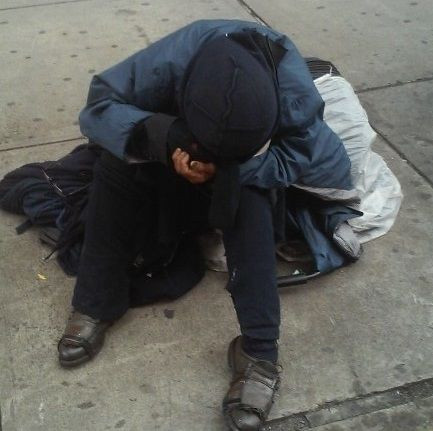Half Of Homeless Population Is Over 50, Yet Social Services Not Aligned With Their Needs

The homeless are aging. In 1990, just 11 percent of the homeless were over 50, but now half are that age, and growing older. A UC San Francisco study suggests that services for the homeless be designed to better meet the needs of the elderly, because homeless people in their 50s have more geriatric conditions than people decades older living in proper homes, according to the researchers.
To gauge the prevalence of geriatric conditions among the homeless, Dr. Margot Kushel, a professor of medicine and senior author of the paper, and her colleagues canvassed shelters, food lines, recycling centers, and homeless encampments for study participants. All 350 homeless she and her team recruited are over the age of 50 and living in the Oakland area. While three-quarters of the study participants are men, 80 percent are African American.
Nearly half had never been homeless (as an adult) until age 50 or older, say the researchers.
The Details
Although their median age was 58, participants had more trouble bathing, dressing, and eating than 80 year olds who had housing, Kushel and her co-researchers say. Participants showed signs of cognitive and visual impairments. They had a harder time using transportation, managing money, applying for benefits, arranging a job interview, taking their medications, and finding a lawyer. They had higher rates of both urinary incontinence and depression. They also were more likely to fall.
These geriatric conditions were consistent for the homeless, no matter whether they camped on the streets, cycled between shelters and hotels, stayed part-time with family and friends, or had recently lost their rental housing, according to the researchers.
More than half of the participants reported poor or fair health status, and chronic medical conditions like high blood pressure were common. Nearly three-quarters had a history of mental health problems, two-thirds smoked tobacco, and more than half had lifelong problems with alcohol or drug use.
Kushel and her colleagues say their findings suggest it is now necessary to develop new ways of helping homeless people, who are increasingly older. According to Kushel, permanent supportive housing would better meet the needs of this population, complete with personal care attendants and grab bars in the bathroom. She believes if alternatives are not provided, many homeless people will be placed in nursing homes, even though they would be better off living in less restrictive — and less expensive — environments.
Source: Brown RT, Hemati K, Riley ED, et al. Geriatric Conditions in a Population-Based Sample of Older Homeless Adults. The Gerontologist. 2016.
Published by Medicaldaily.com



























